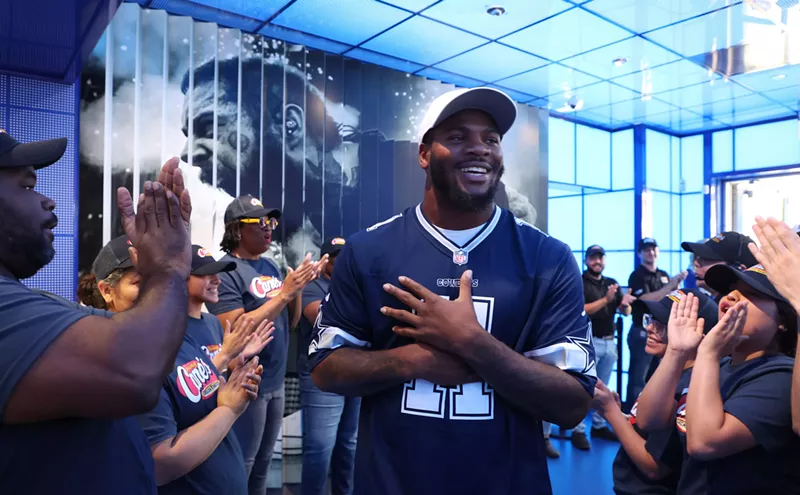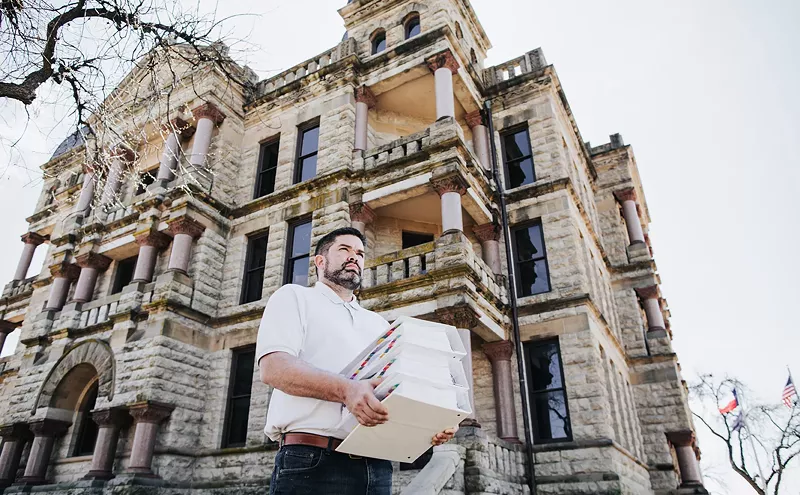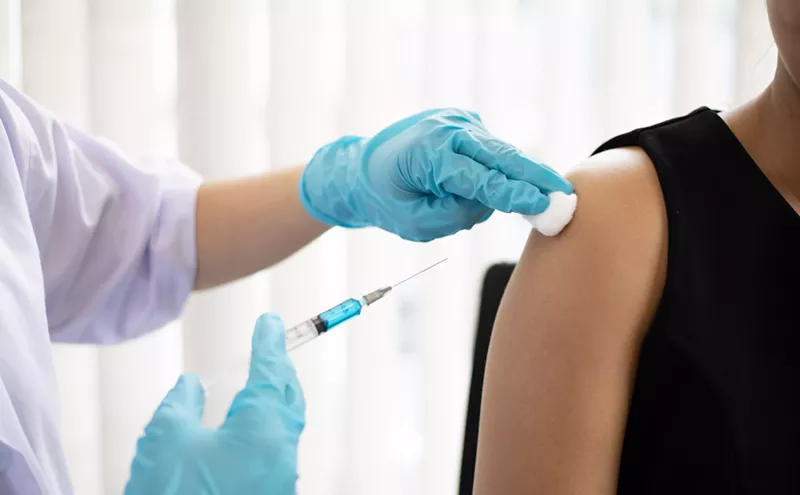The announcer is a little girl. In the clear airspace of Sunday morning radio, her voice is sweet, but the message is heavy. As if introducing story time for the kiddies, she tells listeners, "This is the show that exposes the chemical pushers, the environmental thugs and the certified organophobes."
Quite a mouthful for a first-grader. The introduction to The Natural Way, Howard Garrett's organic gardening show on News Talk KSKY-660 AM radio in Dallas, was recorded almost two decades ago by his daughter, Logan, but it's still aired every Sunday morning in 94 markets around the nation.
In 1989 when Garrett launched his first garden show on WBAP-820 AM, the "chemical-pusher" language barely matched the level of invective hurled at him by detractors. This was one tough town for an organic gardener.
Texas A&M plant expert Dr. Steven W. George, an associate professor and horticulturist in A&M's revered Texas AgriLife extension service in Dallas, and famous Dallas radio garden show host Neil Sperry—mega-stars in the regional gardening firmament—believed devoutly in chemical-based horticulture and took Garrett's message of organic gardening as plant quackery.
But now some of Garrett's toughest critics—even Professor George—concede the latest science is confirming many of the core doctrines Garrett has preached over the years, especially his faith that dirt must be a living organism, not some inanimate grit soaked in a toxic chemical brew.
That change itself—science endorsing organic methods—is amazing enough. But from a strictly local point of view, an even more striking transformation appears to be taking place. Many people in local and regional garden and landscape businesses say the Dallas/Fort Worth market has moved significantly toward Garrett. They say we're a big center of organic gardening.
Think about it. Dallas, Texas, and organic gardening? What next? Huge new mega-churches on freeway service drives devoted to French existentialism?
Surely there must be something missing in this picture, something not told, some kind of information withheld. And there is. It's the story of Howard Garrett.
Garrett probably is the only person in the world who could have coaxed North Texas toward organic methods. Why? Because he's the least hippie-dippy organic gardening guy anybody ever met.
His radio talk show, The Natural Way, airs on Saturdays 11 a.m. to 12 p.m. and Sundays 8 a.m. to 11 a.m. Slung back a bit from the console, fielding listeners' calls in a state-of-the-art studio near the Dallas-Fort Worth Airport, Garrett is tanned and easy-going in a gray golf cap, red polo shirt and shorts.
When he first went on the air 19 years ago, the callers had accents ranging from Easternmost Mesquite to Northernmost Plano. Now because the show is nationally syndicated, the accents reach from Bryn Mawr, Pennsylvania, to Colorado Springs, Colorado.
Most of the questions are about gardening. Some are decidedly not. Doesn't matter. Garrett's answer is always organic.
Tom in Colorado Springs wants to know how to keep weeds from sprouting in his newly built gravel parking area. Should he use "Roundup," a popular weed and grass killer made by Scott's Miracle Gro?
According to the manufacturer's Web site, Roundup contains "2 percent glyphosate, 2 percent pelargonic and other related fatty acids."
Don't know what that means? Easy. Glyphosate is an herbicide derived from an aminophosphonic analog of the natural amino acid glycine; pelargonic is an herbicide containing a common nonanoic acid.
Still don't know what it means? Yeah, well, maybe that's the problem. In an easy-flowing, urbanized East Texas drawl, Garrett recommends his home remedy, which is easy to understand. "Just go to the grocery store," Garrett tells Tom in Colorado Springs, "or to the feed store and get some 8 to 10 percent pickling vinegar. You spray that full-strength. You don't dilute it with water.
"But you add to it a little orange oil, about an ounce per gallon of the vinegar, and you add a tablespoon of liquid molasses per gallon of vinegar, and you add a teaspoon of soap. OK? And you keep it shaken up, because it will settle out.
"You spray those weeds as they're coming up, and man, it works as well as Roundup, and it's not a toxic product like Roundup is."
No matter what they ask him, Garrett's on-the-air persona is always matter-of-fact and common as dirt. Off-the-air he's a little more than that. He tells a visitor that at 61 years of age, "I'm probably in better shape than any time since the Marine Corps."
He also says: "I think I have been involved in the creation of a new mainstream."
Modesty did not make Howard Garrett. And maybe at this point he has a right to be sure of himself: He is an author with 15 books in print and two in progress, his own syndicated radio show claiming 655,000 weekly listeners in 16 states from Massachusetts to California, a weekly newspaper column, a Web site that claims almost 10 million hits a month and more than 5,000 unique visitors per day, a newsletter with more than 30,000 subscribers and a small empire of organic products sold in more than 3,400 stores.
Lurking beneath Garrett's friendly old-shoe exterior is a folksy doctrine of horticulture—a philosophy of life, really—explosively at odds with American culture since World War II. The post-war years saw the enormous bloom of science and technology as tools of agriculture and horticulture.
Men and women in white lab coats invented chemical potions to be poured on soil by giant corporate farmers and homeowners alike, culminating more recently in the development of genetically engineered crops.
Since first going on the air in Dallas in 1989, Garrett has preached that it's all upside-down. Nature is smarter and infinitely more complex than the scientists have guessed. The more efficient and effective—and cheaper—way to grow good plants is to encourage Mother Nature in her sometimes mysterious work and keep the chemicals away.
In all of this, no element is more important to Garrett than rich, natural, chemical-free soil—hence the self-anointed title, "Dirt Doctor."
He has insisted for almost two decades that dirt must be a living organism, a complicated webwork of natural ingredients—naturally occurring chemical elements, bugs, worms, fungus, rotten stuff, growing stuff, all working together.
"The chemical approach is that you push the plant with synthetic chemicals primarily, and then you control the events that pop up with these chemical pest control products. The soil doesn't even come into it.
"The organic approach is that you help nature by creating healthy soil that's biologically alive and active. That condition naturally feeds the plants and naturally sets up a pest resistance.
"That's the basis of it. The heart and soul of the whole thing is soil."
Two decades ago in conservative Dallas, it all sounded screwy. Shrubs and flower beds were architectural burnishes in a sun-scorched, crack-soiled geography assumed to be hostile to fancy plants. The only way to make a rose bush bloom in Dallas was by beating the soil into submission with a chemical baseball bat.
How the worm has turned.
People in the local nursery biz say the Dallas area now is at least evenly split between home gardeners and businesses using entirely organic methods and those who still depend on chemicals, making this one of the nation's organic hotbeds.
And almost everyone in the field gives Garrett a lot of the credit. Neil Sperry, who has built a personal gardening empire around his own very popular show, "Neil Sperry's Gardens" on KRLD-1080 AM (Sundays 8 a.m. to 11 a.m.) says: "Howard is a very compelling person. He has an easy voice to listen to."
Sound a little like Hillary praising Obama? Give Sperry credit. It's way nicer than what he used to say about Garrett's advice. "It is in no way steeped in research or documentation," Sperry told The Dallas Morning News in 1996. "Much of it appears to the average listener to be shoot-from-the-hip answers, and I'm not the only one who has said that."
In the dozen years since Sperry spoke those words, the changes in science have been remarkable—the wave buoying Garrett up and bringing organic gardening into the mainstream. Mike Amaranthus, a soil scientist at Oregon State University, says: "You know why the mountain has come to Howard, don't you? It's because he was right."
Garrett did not come to organic gardening by way of ideology. If anything, he seems to have wandered in through the back door. The son of store owners in Pittsburg, Texas, his first collision with chemicals happened when he was a parks administration student at Texas Tech.
"It took me one class in chemistry to realize I wasn't smart enough for chemistry," he says.
His landscape design and horticulture classes, on the other hand, were huge fun. "In landscape design I enjoyed it so much I did the drawings for two of my friends who were in the class."
Garrett's first jobs out of school were in the golf course business. Later he walked door-to-door in new subdivisions in Dallas, selling his services as a landscape designer.
In those days Garrett poured chemicals on yards and gardens with the best of them. All of that changed, he says, in 1985, the year Logan, his only child, was born.
"That was the main turning point," he says. "I still have some classic pictures of her, 9 months old and bald-headed, picking stuff up off the floor and sticking it in her mouth. That's when it just hit me like a ton of bricks that it didn't make sense to have toxic stuff around the house.
"I literally at that point didn't have a clue what organic was. I had never been exposed to it."
Garrett thinks the fact that he sort of wandered into horticulture may have saved him from the rigid thinking of more formal practitioners. "I probably didn't get quite as brainwashed as some people. Especially when you go to A&M, there is such a huge pride about being there.
"I had an ability for some reason to say that doesn't make sense. I'm going to look into this on my own."
When little Logan's eating habits spurred his change of heart about garden chemicals, Garrett went to the Texas Department of Agriculture for names of organic growers. It was the meager beginning of what became a long and intense program of self-education.
In the meantime Garrett's success in the landscape business was growing. In 1980 he merged businesses with the legendary Joe Lambert, a flamboyant figure given to capes and an eye-patch, whose Lambert Landscape Company introduced Dallas to azaleas and dramatic landscape color in the 1940s. With Garrett as a partner, Lambert's went totally organic.
Even before he took to the airwaves, Garrett was already espousing strange notions—pouring molasses on soil instead of fertilizer, defeating pests with orange oil, treating sick plants with something called "Garrett Juice."
Bobby Spence, marketing director for Nature's Guide, a national line of organic gardening products manufactured in Fort Worth, which advertises on both Garrett's and Sperry's radio programs, describes an incident early in Garrett's career as an organic advocate: "He and I did a presentation once in 1989, after we first met, for the Arlington Men's Garden Club. They were just nothing but chemical people."
Garrett went into the lion's den in Arlington and preached organic methods. "They razzed him a little bit," Spence says, "but Howard went right on. And he was very well received."
This was at a time when Dallasites were still cheerfully dousing their lawns and gardens with Diazinon and Dursban, both banned in 2000. Diazinon, a chemical cousin of the nerve gas, sarin, was associated with cancer, birth defects and nervous system damage. National studies since the bans have shown improved birth weight and length of newborns.
Back when Diazinon and Dursban were still on the shelves—their manufacturers buying plenty of advertising on shows like Sperry's—the opposition to Garrett was fierce.
But that was then. This is now. A whole lot has happened.
Now when Sperry and George of A&M speak about gardening and landscape methods, they sound at times as if they are trying to out-organic Howard Garrett. George says, "Since World War II the American public has butted heads with Mother Nature. 'We're going to spread pesticide or fertilize the bejeebers out of it,' without knowing whether it's the right thing."
George, weary by now of his long personal warfare with Garrett, spoke to the Dallas Observer only on the condition that he not be asked to talk about Garrett personally. His main project in life now is the development of a line of 90 percent organic rose bushes, trademarked "Earthkind" by A&M and grown almost but not quite entirely without chemicals.
When he talks about what he has learned in the development of these roses, George sounds uncannily like...forgive us, Professor George, and please sit down for this...he sounds a whole lot like Howard Garrett:
"We are using the strongest plant genetics," he says, "best adapted for that area, with the highest levels of genetic tolerance to insects and diseases.
"We're coupling that with great environmental soil enhancement."
He's talking about good dirt—living dirt. That would be, ahem, may we say it? Dirt-doctor dirt.
"When you do that, you instantly bypass 99 percent of the problems with ornamentals [garden plants]," George concludes. "It's nothing magical. It's just great plant genetics and really good soil management."
George is candid and good-natured about saying all of this represents an enormous turnabout from what he was taught and what he for years taught his students: "If you had asked me 10 years ago, I would have said you're out of your mind. This goes against so much of what I was taught. Certainly there are significant things that we have learned here that are wrong in horticulture books and wrong in my education."
But George's change of heart, dramatic though it may be, is no more stunning than what seems to be going on in backyard gardens and on commercial properties all around Dallas.
Many people in the garden and landscape business agree that the Dallas-Fort Worth area has come around by some significant degree to Garrett's point of view. Definitive numbers are tough to come by, but the anecdotal testimony paints a picture.
Bobby Spence of Nature's Guide is convinced that Dallas and Fort Worth make up one of the country's biggest organic gardening markets.
"The Dallas-Fort Worth metroplex is by far—by far!—the largest area in the United States to sell organics," Spence says. "I just got back in May from the national hardware show out in Las Vegas, and it's amazing to talk to people [from other regions] about organics.
"They still just don't have a clue. They say, 'Well, our market is just not ready for that. Our consumer's not looking for that."
Spence says Dallas is way ready. He estimates home gardeners in the Dallas region are now split approximately 50/50 between organic methods and the use of chemical-based synthetic fertilizers and pesticides.
Two of the region's oldest retailers of garden products, Elliott's Hardware and North Haven Gardens, straddle the fence in the organic versus synthetic debate, offering both kinds of products but leaving the choice to their customers. Both companies see organics moving up quickly, making the region a national leader.
Kyle Walters, president of Elliott's Hardware, calls organic gardening in Dallas "the direction that it's all headed." He doesn't see it at quite 50/50 yet. "Our sales of organic products have dramatically increased but still haven't overtaken the synthetic side of the market."
Jon Pincus, president of North Haven Gardens, isn't quite ready to put Dallas at the head of the class for organic gardening nationally but agrees that it's high on the list. "I tend to think that California has the most interest in organic gardening and organic produce. They kind of lead us there.
"Colorado is very strong in that regard. As are we here. The nursery industry in other parts of the country is definitely lagging behind."
The National Gardening Association, headquartered in Burlington, Vermont, is closely associated with the traditional garden supply industry and tends to be conservative in its approach to organics. Bruce Butterfield, the association's research director, says he knows of no definitive numbers comparing organic product sales in local or regional markets around the country, but he agrees that the organic trend is strongly upward nationally.
"Five years ago, 5 percent of households nationally were using only all-natural, organic gardening methods," Butterfield says. "Last year it was probably at 10 or 12 percent. Five years out, I'll put it at 20 percent."
If Dallas is already much more organic than Butterfield's national projection, how and why did that happen? Leslie Finical Halleck, the general manager of North Haven Gardens, says the change is the result of relentless pressure from garden and landscape customers in Dallas, especially younger ones.
"In my age-group, pretty much hard-core gen-Xers," she says, "they've got their first homes now, they're starting to venture into that territory, and I think as a group they are just more receptive from the start to choosing that kind of lifestyle."
Based on questionnaires and comment forms filled out by North Haven customers, Halleck says, "They want composting. They want rainwater collecting. They want organic gardening. They want to know how to do things."
What things?
"Last weekend we had a class on canning."
The gen-Xers want to compost and can?
Yes, she says, but it's not just gen-Xers. "There are a lot of just kind of normal folks out there who are being pushed into receptiveness by the economy, by the increased cost of fuel and cost of food.
"Vegetable gardening is really going to be the push that pushes a lot of people over the edge, because once you start growing your own food you start to be a little more selective about what you want it to absorb."
Many people in the local garden supply business credit Garrett with helping create this demand for organic products. Spence says, "Howard has changed this market. He has changed it tremendously, and he has changed it for the better."
Pincus says, "Howard deserves a lot of the credit, absolutely."
But let's imagine—just for the sake of argument and not because it's true at all, of course—that gardeners tend to be a bit on the odd side anyway, maybe one or two organic carrots short of a peck. The real proof, then, of Garrett's persuasive power would be the success he enjoys in harder-nosed venues.
The Tierra Verde Golf Club, an award-winning city-owned course in Arlington, is now run on an almost 100 percent organic basis under Garrett's tutelage.
Tierra Verde superintendent Mark Claburn says Garrett's organic techniques have enabled him to operate at significant financial savings over golf courses still employing traditional chemical methods of turf maintenance. Part of it is that Garrett's methods solve many pest problems without expensive pesticide.
"There are guys in the metroplex on golf turf with the same exact grasses as me," Claburn says, "that are spraying fungicides every 21 to 28 days, at about $1,000 per application, and I haven't had to in four years."
The natural soil Claburn has developed beneath his turf holds water much more efficiently than soil gutted by chemicals. That difference alone delivers major savings in water usage. Claburn cites a recent industry report that put average water usage for golf courses in the Southwest at 150 million gallons per year.
"We use 67 million gallons a year," he says.
The cost advantages of the organic approach have become even more dramatic recently because the chemicals, all derived from oil, are beginning to soar with rising fuel prices. "In fact this year we have actually had trouble finding organic product," Claburn says, "because so many golf courses are turning to natural fertilizers."
Garrett has persuaded some major corporate clients with North Texas headquarters to convert their campuses to organic management, including the international junk-food giant, Frito-Lay. In response to an inquiry, Frito-Lay didn't deny its Plano campus is organic but didn't want to talk about it.
Garrett says his corporate clients' motivation for going organic is simple. "It looks better. It's cheaper."
But it's more than that. Iscar Metals, a maker of precision carbide metalworking tools with headquarters in Arlington, has managed its four-acre campus on the Garrett plan for 13 years. Iscar came to Garrett because its executive vice president, Reggie Louder, heard him on the radio. Something about Garrett's philosophy, tinged by little Logan's intro, reached Louder in his car full of his own kids.
"We were driving to the lake a lot in the mornings," Louder says, "and I would always listen to Howard on the radio. My kids in the car would get so sick of hearing it. They could recite Howard's sick tree treatment. Before Howard could answer a question, my kids would say, 'Sick tree treatment,' and they knew what it was."
Louder was intrigued. "Our lawn at home never was doing too good, unless you put fertilizer on it, and then it would only look good for a while. I remember trying to pull weeds. I couldn't even stick a screwdriver in the ground hardly."
Louder began experimenting with Garrett's approach. "Lo and behold, you know, it started working. I could go out there and pull weeds, and I didn't water near as much. It just really worked."
In 1995 when Iscar built its new campus in Arlington, Louder decreed that it would be managed a la Garrett. "I just told everybody here that's what I wanted to do. There's no reason not to."
If all of these people are right—if Howard Garrett has been leading this Bible Belt bastion of rock-ribbed conservatism anywhere at all—then some kind of adjustment must be made. Either Garrett is not as out-there as he sometimes sounds, or Dallas is more out-there than it thinks.
Garrett's company, Dirt Doctor Inc., occupies the entire sunny second floor of a two-flat building in a genteel East Dallas neighborhood. Its business is his books, radio show, newspaper columns, a growing line of organic products produced by others but licensed under the "Dirt Doctor" logo, and his services as a consultant.
The offices occupy a tidy, tasteful but informal space, shared with a full-time business manager and an administrative assistant. Behind a broad desk he pours green tea for a guest—a gift, he explains, from a major client in China—and offers a thumbnail sketch of what he believes.
"It's a philosophy of living," he says. "I never have colds. I never have the flu. I'm very anti-vaccine. I've never had flu shots."
He's anti a lot of things.
"Soap is a good example," he says. "You use these anti-bacterial soaps, but there are a lot of bacteria on your skin and your body that are beneficial. You put that chemistry on there, one, you screw up that balance. And, two, the chemistry of that stuff is toxic."
He won't eat beef that isn't grass-fed and purchased from certain suppliers found only in farmers' markets. "Organically grown stuff is far superior in flavor," he says, "and the food value is greater. Grass-fed versus the feedlot makes a tremendous difference.
"When a cow goes through a feedlot and is fed corn and fed all the hormones and pesticides and everything, it changes its gut completely, and you end up with a meat that's completely different than a meat that's raised on grass."
He brews up his own health drink every day. The recipe calls for diatomaceous earth—a white chalky powder from crumbled-up plant fossils—fish oil, vinegar and "some kind of juice."
For most of us that would be a pretty tough swallow, even if "some kind of juice" could be stretched to include gin. But before anybody dismisses Garrett as a kook because of it, serious acknowledgment must be given to the shift of science in his direction.
Professor Amaranthus, who believes the mountain has come to Garrett, says, "I've done research for 30 years. I started out as a really conventional agriculturally-based, chemically treated kind of scientist with the USDA. I used to pooh-pooh the Howards of the world, as well, and that's why the universities of the world are coming to them. It's because they were right, for lack of a better term."
Amaranthus is head of a company that produces products advertised on Garrett's show. But scientists who have never heard of Garrett say similar things.
Frederick Kirschenmann, a Ph.D. Distinguished Fellow at the Leopold Center for Sustainable Agriculture at Iowa State University, argues that chemical-based agriculture just doesn't work and won't sustain necessary world food production levels in the near future. He believes several factors—pollution, toxicity, the breeding of chemical-resistant weeds and pests—are already greatly reducing the viability of chemical agriculture.
Looming over this new awareness is the importance of living, "sustainable" soil. In April of this year, the United Nations published a report arguing that local organic farming is the only method by which the world can stave off catastrophic global famine.
The U.N. report echoed themes often stated in work by Amaranthus and other researchers: chemical-based, industrial-scale "mono-culture"—huge fields of all one crop worked by big machines and doused with pesticides and herbicides—creates bigger problems than it can solve. It causes new pest and weed outbreaks by triggering resistant genetic mutations. It depletes soil.
None of this makes Howard Garrett a scientist. Neil Sperry also agreed to be interviewed for this story only on the promise that he would be asked questions about horticulture, not Garrett. Both he and George said they saw no benefit in a war of personalities.
But both wound up saying similar things about organics, mainly that the question isn't organic versus chemical but science versus folklore. In what they had to say, even though they pointedly were not talking about Garrett personally, another unmistakable theme was loyalty to Texas A&M.
Both expressed hostility for those unnamed persons who have made careers of calling A&M scientists "chemical-pushers" and "environmental thugs."
"What you have with university research is repeatable results," Sperry says. "If I do all of these things and have only one variable, it should happen again. This is what I watched my father do for A&M. My dad was a Ph.D. botanist, a range ecologist."
He calls the work of people such as George "great research done by scientists, not by backyard zealots."
On a hot summer day George stands over a vast field of test plots in Farmers Branch, where rose varieties are grown without fertilizer or pesticide under rigidly controlled conditions. His point in bringing a reporter here is to demonstrate the effort and expense required to really prove anything about horticulture.
"I've had well-meaning people come to me," he says, "homeowners, honest as they can be, but they're not scientists, and they'll say, 'Steve, I spread molasses all over my flower beds, and the flowers grew better.'
"Well, you probably did, but unless you have a non-treated control, you can't draw the conclusion that the plants grew better because of the molasses. In my opinion, that's the leap that you can't make."
None of the rose bushes George is testing here gets help from chemicals. Some are brilliant green and red beneath a battering sun. Some are puny. At the end of a 10-year process, the roses that still shine will be deemed "Earthkind" by A&M. The puny ones will be history.
"I want to give credit where credit is due," he says. "I think there is no doubt that well-meaning people in the organic movement have helped to pave the way for Earthkind, where the public is much more willing to listen that there is a better way and you don't have to have perfection."
But George pointedly does not want to share that credit with unnamed persons whom he deems "fervent."
"A lot of people in the organic movement that I've met, they're so fervent, it's almost like a religion to them. I'm not talking religion, I'm talking science."
Bobby Spence argues that Howard Garrett had to be a zealot, given what he was up against. Only a zealous personality could have overcome the enormous business and cultural inertia in favor of chemical-based agriculture and horticulture. Spence remembers asking Garrett years ago why he—such a normal-seeming guy—was so bent on a strange mission like organic gardening.
"He asked me, 'How old is your daughter now?' I said, 'Well she's 6 months old.' He said, 'Think about it. In about six more months she's going to be crawling around that backyard, and what do you really want to put on that yard?'
"Let me tell you," Spence says. "There hasn't been a chemical put on my yard since then."
It doesn't mean that Howard Garrett is going to take over the world, make us all wear Dirt Doctor uniforms and eat diatomaceous earth. Even little Logan who started all of this—grown up now and a recent U.C.-Santa Barbara graduate—confesses to small reservations about his doctrine.
"I'm very aware of it, and I'm all for his message," she says from a post-graduation road trip recently. "But I've been camping in Northern California, and last night I sprayed DEET all over my legs because I was getting eaten alive."
If only Logan had accessed the Internet on her way to her campsite, she could have gone to dirtdoctor.com where she would have found an article about Duke University studies linking DEET, an abbreviation of N,N-diethyl-meta-toluamide, to "diffuse brain cell death and behavioral changes in rats after frequent and prolonged use."
If only she could have stopped by a grocery store, she could have picked up the makings of her father's recommended repellent: 8 ounces of water, two teaspoons of vanilla extract and one teaspoon orange oil.
Hopefully she'll come back to Dallas one day, become thoroughly steeped again in the local culture and put away all those crazy California notions like DEET.
Organic gardening. It's the new conservatism.












